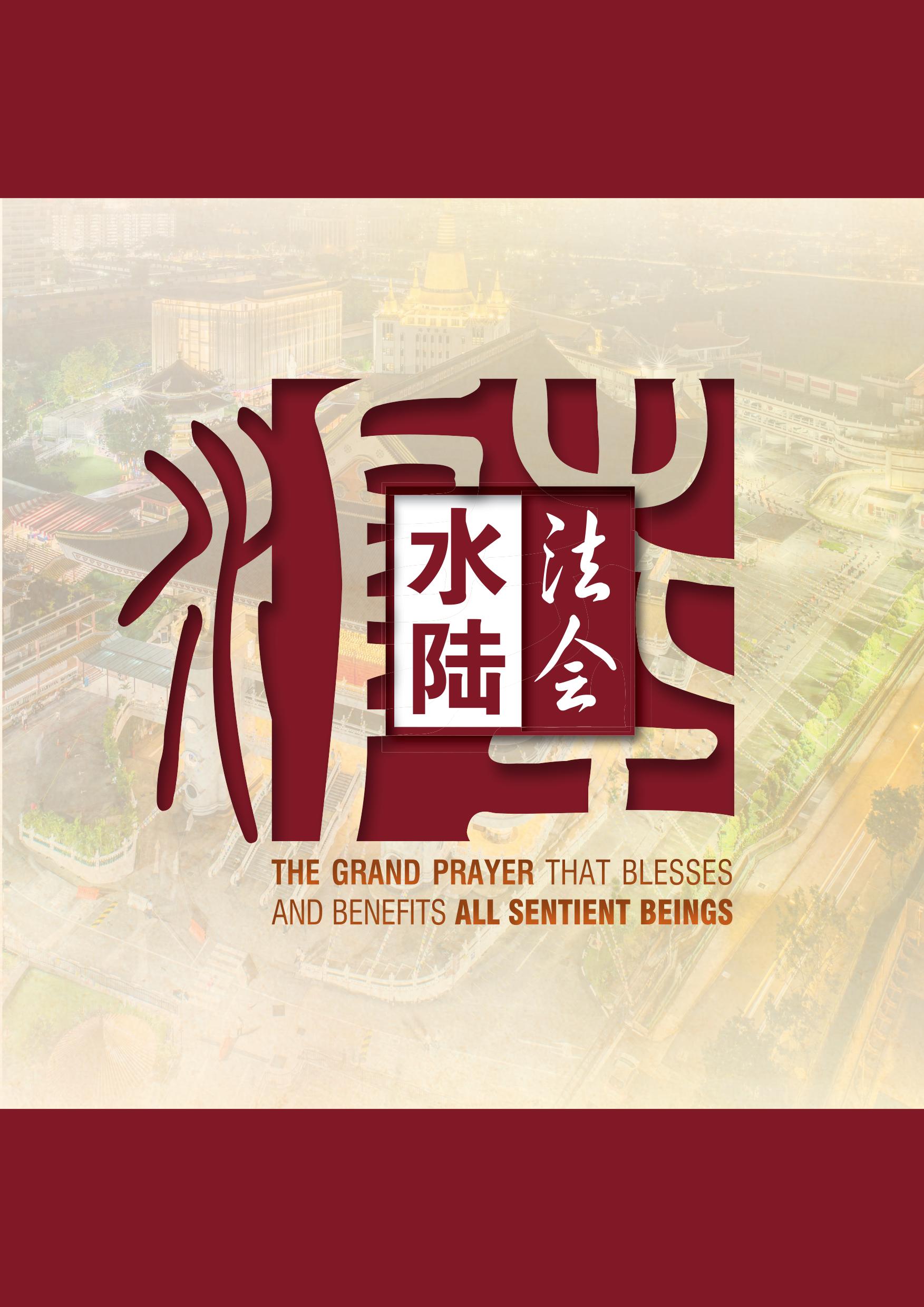
目录 Content
1. 水陆法会的缘起
2. 参加水陆法会的利益
3. 水陆仪轨

4. 各坛简介
5. 法事简介
1. The Origin of The Grand Prayer That Blesses and Benefits All Sentient Beings (Water and Land Puja)
2. The Benefits of Participating in The Water and Land Puja
3. The Ritual of Water and Land Puja
4. Introduction of The Shrines
5. Introduction of The Puja
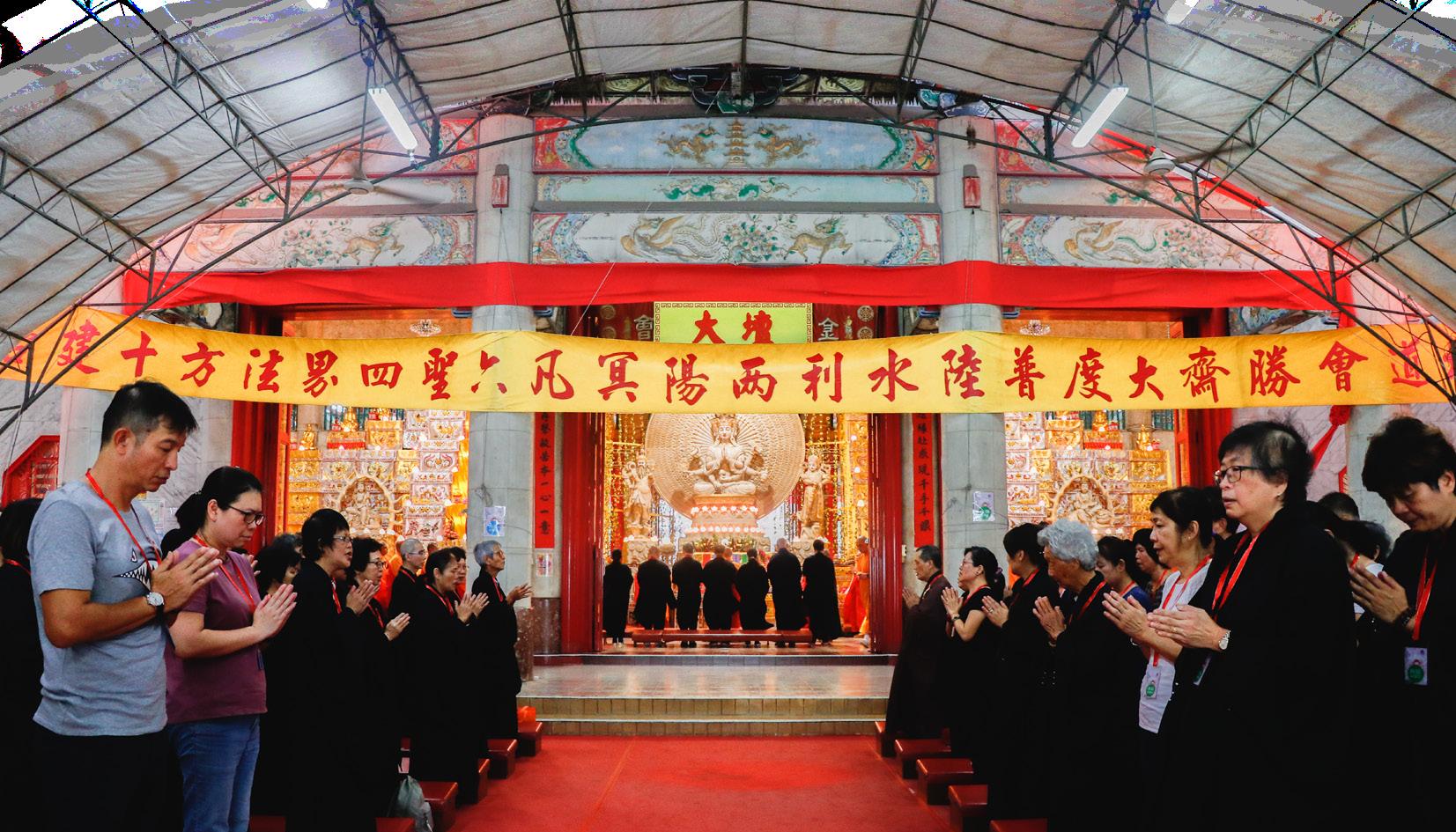 THE GRAND PRAYER THAT BLESSES AND BENEFITS ALL SENTIENT BEINGS
THE GRAND PRAYER THAT BLESSES AND BENEFITS ALL SENTIENT BEINGS
水陆法会



THE GRAND PRAYER THAT BLESSES AND BENEFITS ALL SENTIENT BEINGS
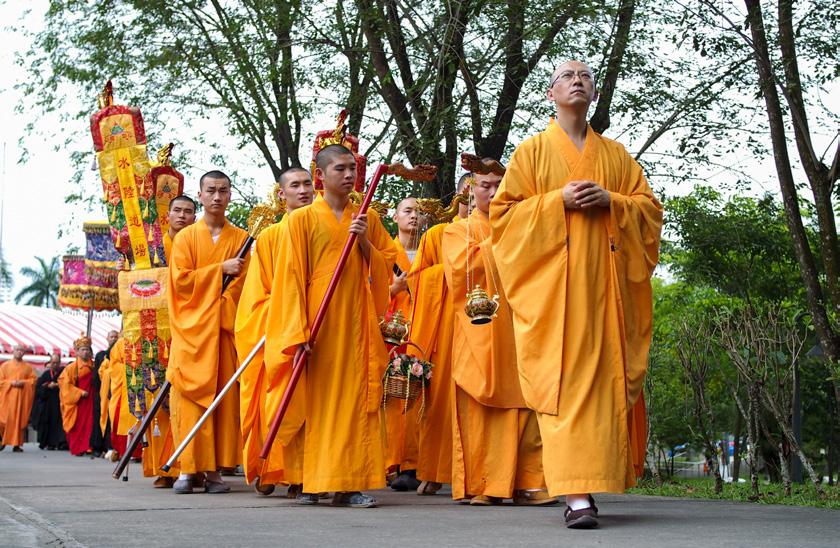


缘起
水陆法会是汉传佛教中最盛大、最殊胜的法会之一,上供十
方诸佛菩萨四圣,下施水陆空一切六道众生和十方法界孤 魂等众。根据《佛祖统计》卷三十三记载,梁武帝(464549年)曾梦见一位神僧相告:“六道四生受苦无量,何不
作水陆大斋以拔济之?”在宝志禅师(418-514年)的建 议下,梁武帝在大藏经中广寻经典,三年之后方才把水陆仪 文编成。梁武帝夜间手捧仪文,长跪佛前说:“水陆仪文若 文体不通,有所违背教义,不能广济众生,则灯暗如初;若 道理契合,能广济众生,愿拜后灯烛自明。”说完礼拜后, 所有的灯烛不点自明,无尽的花朵从天而降,由此可见水陆
第一次的水陆法会在天监四年(505年)于镇江金山寺启 建,梁武帝为会主,僧祐律师(445-518年)为主法。启 建一堂水陆法会,需七个昼夜才能功德圆满。一次水陆法会 约需数十位至百位法师参与,动员人力、物力颇巨,不是普 通寺院可以轻易启建。一场水陆法会若仅由一位信众及其家 人独资营办,这场水陆法会称为“独姓水陆”;若法会是由
许多信众共同发起,所
需资金也是众人集资,
这场水陆法会则被称
仪文的殊胜。
为“众姓水陆”。
4


水陆法会全名为“法界圣凡水陆普度大斋胜会”, 它的名称有以下的意义:
1. “法界” 是指整个宇宙的万事万物。他们在法性上是理理 一如,平等不二,所以称为法界。
2. “圣凡” 是指法界中的四圣(佛、菩萨、缘觉、声闻)和 六凡(天、人、阿修罗、地狱、饿鬼、畜生)。
3. “水陆” 是指有情众生居住栖息的处所,有陆地、水域, 同时也包括各类空间。
4 . “普度” 是指对众生一视同仁,“普”遍的施予,让每个 众生都能“度”脱生死轮回,得到佛法的真实利益。
5 “大斋” 是指广“大”的施予众生清净的食物。
6 . “胜会” 是指殊胜的法会。因为在水陆法会期间,不单单 是布施众生饮食,更有诵经持咒的法施令受苦众生离苦 得乐,得到法水的滋润,因此称作胜会。同时“会”又
有聚集意思,有缘众生集会一堂,在胜会中供养三宝, 并请僧众恭诵经典以利益一切众生之意。
除了此名称,水陆法会也被称为(一)水陆会;(二)水陆 道场;(三)悲斋会;(四)水陆无遮大会;(五)天地冥 阳水陆大会。
THE GRAND PRAYER THAT BLESSES AND BENEFITS ALL SENTIENT BEINGS
THE GRAND PRAYER THAT BLESSES AND BENEFITS ALL SENTIENT BEINGS
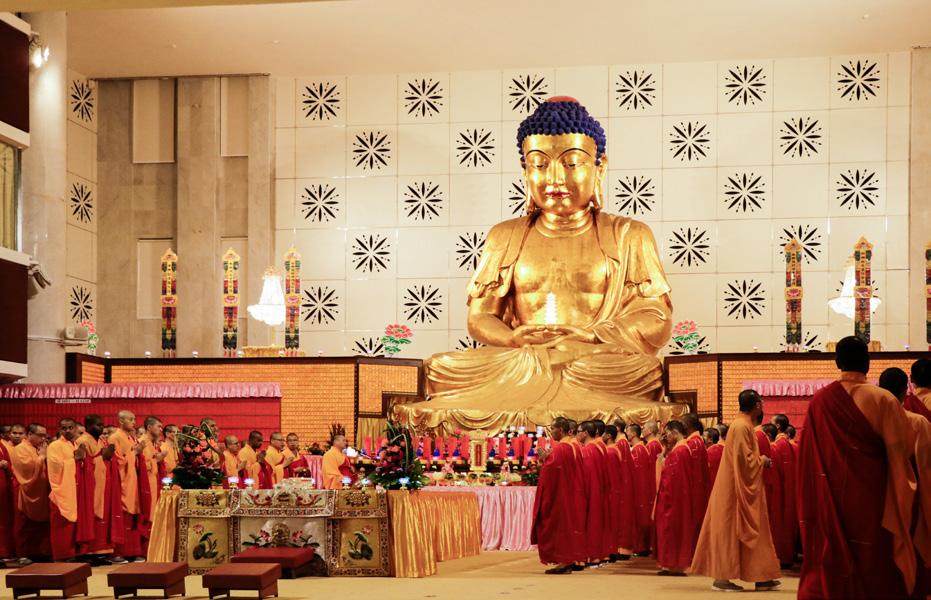


参加水陆法会的利益
水陆法会是供养、普渡一切众生,使其度脱恶道、离苦得
乐,冥阳两利的大法会。参加水陆法会可令自身及眷属消灾 延寿、增福增慧,亦可荐福先亡早日超升。
一、 生者利益:
宋朝的宗赜法师在《水陆缘起》里曾提及:“今之供一
佛、斋一僧、施一贫、劝一善,尚有无量功德,何况普
遍供养十方三宝、六道万灵,岂止自利一身,独超三
界,亦乃恩沾九族。”《佛说布施经》亦云:“若以上
饮食供养三宝,得五种利益:身相端严、气力增盛、寿 命延长、快乐安稳、成就辩才。”因以饮食上供诸佛菩
萨及一切贤圣,下施法界一切有情,功德无可限量。
二、亡者利益:
亡者听闻佛法,皈依三宝,受持幽冥戒,可长养悲心、 增长善根,脱离三恶道,离苦得乐。此外,未发菩提心
者,发大菩提心;未脱苦轮者,得不退转;未成佛道 者,得以成佛道。
水陆仪轨
法会的流程依据迎请、供养及奉送三大部份划分为下列仪 轨:
结界洒净:
坛场初启,三宝圣众将莅临,因此礼请龙天护法护卫道场, 诵咒结界,并以咒水洒净,使道场上下四方严净,与会大众 身心光洁。

发符悬幡:


发符就是发出邀请,上达天庭、下至地府,昭告人天,使诸 佛菩萨及六道众生都能前来参加圣会。由不同名称的持符侍 者,将请帖送给列在上堂十席、下堂十四席,邀请参加法会 的圣、凡与排位对应。法会期间均挂有一幡,上书写“启建 十方法界四圣六凡水陆普度大斋胜会道场功德”之悬幡,挂 于刹竿之上。这样悬幡高置远处法界众生亦能一目了然。夜 幕甫至,更点亮九莲宝灯,如此,那些在黑暗中远行无祀的 鬼道众生也能前来参与法会,共沾法益。
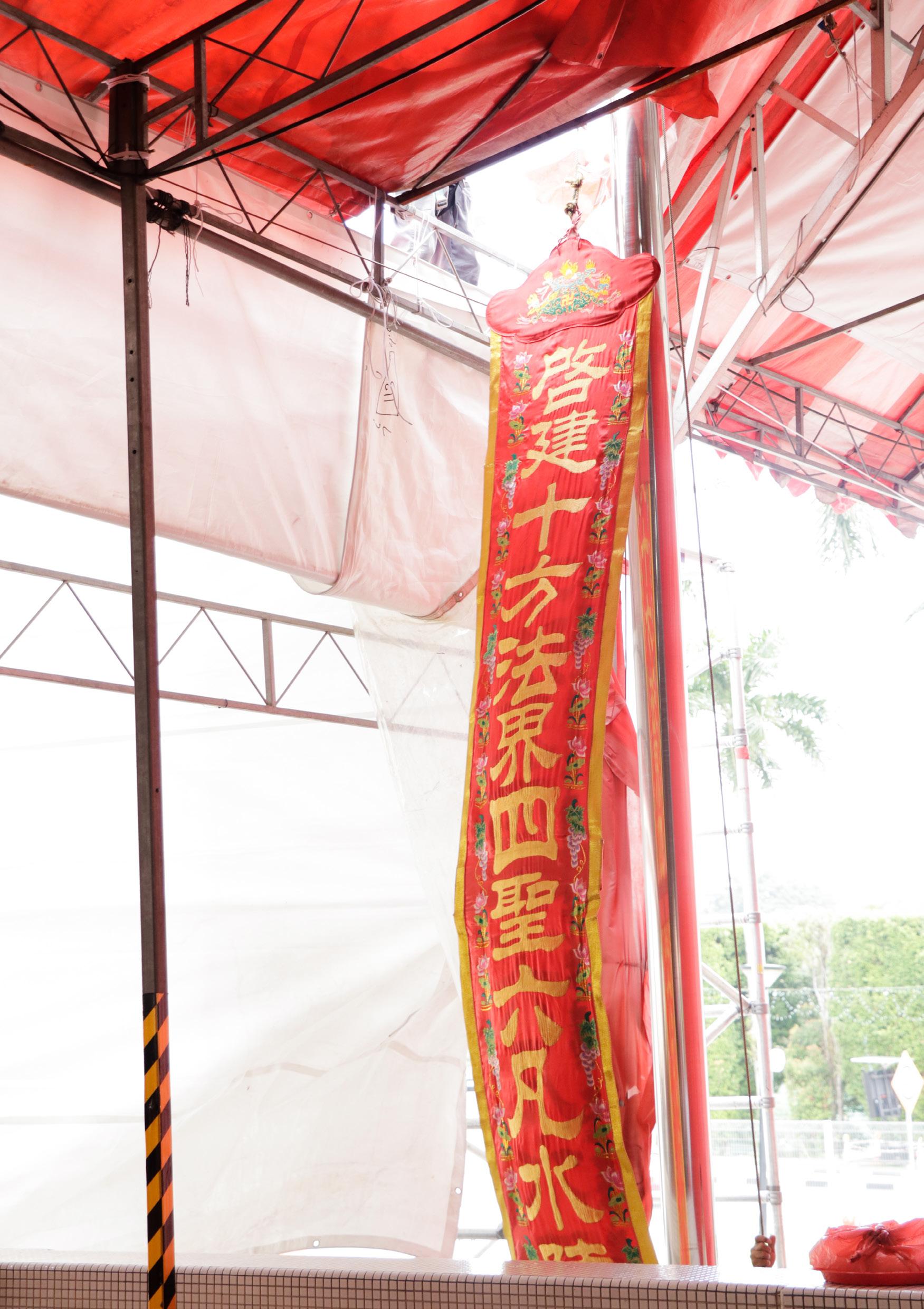
THE GRAND PRAYER THAT BLESSES AND BENEFITS ALL SENTIENT BEINGS


请上堂:
礼请诸佛、菩萨、圣人等莅临法会,悲悯众生,为众生宣说 佛法。上堂共有十席,其中包含:
一、 诸佛: 尽虚空遍法界十方常住一切诸佛,并诸眷属。
二、 法宝: 尽虚空遍法界十方常住一切尊法,并诸眷属。
三、 菩萨: 尽虚空遍法界十方常住诸菩萨僧,并诸眷属。
四、 缘觉: 尽虚空遍法界十方常住诸缘觉僧,并诸眷属。
五、 声闻: 尽虚空遍法界十方常住声闻僧,并诸眷属。
六、 宗师: 十方法界传持教法,禅律诸宗祖师僧,并诸眷
仙人: 十方法界助宣佛化,持明造论五神通仙,并诸眷 属。
八、 明王: 十方法界十大明王,秽迹金刚,诸大天王,护法 诸天,并诸眷属。
九、 护法: 十方法界护佛舍利坛塔伽蓝,斋戒护国镇宅诸大 神王,并诸眷属。
十、 大士: 发扬水陆,流通至教,制仪立法十大士,并诸眷 属。
七、
属。
供上堂:
打斋施主以香、花、灯、食、宝、法等六尘妙供,向奉请至 内坛十席之诸佛菩萨及贤圣敬献供养,以表达对诸佛菩萨的 虔敬之心。
告赦:
在请下堂众生前需先行“告赦”,供请两位使者携带两封赦 书及一道赦碟给诸天,祈请梵天、帝释天及天将协助,送赦 书给地府陈情,以让受苦受难的地狱、鬼道众生获得大赦, 得以前来水陆道场受供、听法。
请下堂:
召请六道众生前来参加法会。下堂共有十四席,其中包含:
一、 三界: 十方法界四空四禅、六欲诸天、日月星天、 天曹圣众,并诸眷属。

二、 岳神: 十方法界五岳四渎、地载游空、福德诸神、 係祀灵庙,并诸眷属。
三、 儒道: 十方法界帝王后妃、文武官僚、儒宗贤哲、 仙道隐逸,并诸眷属。

四、 人众: 十方法界农民工商、医卜杂流、贵贱男女、 十类人伦,并诸眷属。
五、 修罗: 十方法界四类受生、五趣所摄、山间海底、 阿修罗众,并诸眷属。
THE GRAND PRAYER THAT BLESSES AND BENEFITS ALL SENTIENT BEINGS 8
THE GRAND PRAYER THAT BLESSES AND BENEFITS ALL SENTIENT BEINGS


六、 饿鬼: 十方法界焰口鬼王、三品九类诸饿鬼众、横 死孤魂,并诸眷属。
七、 阎罗: 十方法界阎摩罗王、十王王妹、十八小王、 诸司主吏,并诸眷属。
八、 地狱: 十方法界八热八寒诸大地狱、诸独孤狱、一 切受苦囚徒,并诸眷属。
九、 畜生: 十方法界正住铁围山间、边住遍五趣中、鳞 甲羽毛十类旁生,并诸眷属。
十、 中阴: 十方法界诸趣往来、七七日内七返受生中陰 趣众,并诸眷属。
十一、 城隍: 杭州府城隍列庙九县乡坊係祀灵祠、诸侯王 众,并诸眷属。
十二、 土地: 本寺所属当境神祠、伽蓝、住居六神、山门 奉事香火诸神,并诸眷属。
十三、 祖宗: 施家上世祖宗亡灵、师友亲眷、诸位神仪, 并诸眷属。
十四、 祖师: 本山上世祖宗亡灵、师友亲眷、诸位神仪, 并诸眷属。
供下堂:
以六尘妙供(香、花、灯、食、宝、法)施供十四席,令人 道顿悟归真、修罗道调伏嗔心、饿鬼道咸获饱满、畜生道自 得智慧、地狱道永脱拘囚。
注:众生因六根六识分别六尘,今转染 为净 ,化六 尘为 妙供。
授幽冥戒:


授予亡灵菩萨戒,令众生守戒,借以远离一切身、口、意恶 业,而获清净,增长善心与善法。
上圆满供:
幽冥戒后,人天欢喜,普同斋供上、下堂二十四席及一切圣 凡,预告法会即将圆满。在送上、下堂之圣凡离开以前,斋 供以作为践行之意。
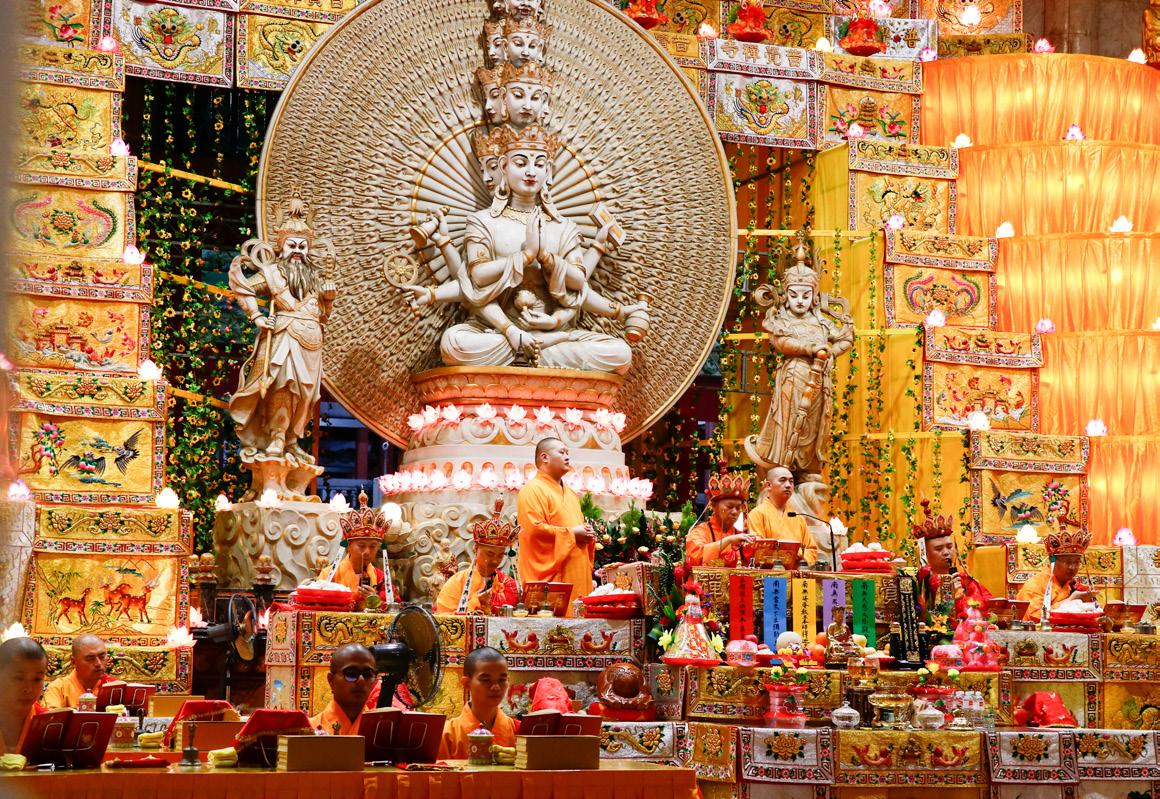
THE GRAND PRAYER THAT BLESSES AND BENEFITS ALL SENTIENT BEINGS 10
THE GRAND PRAYER THAT BLESSES AND BENEFITS ALL SENTIENT BEINGS
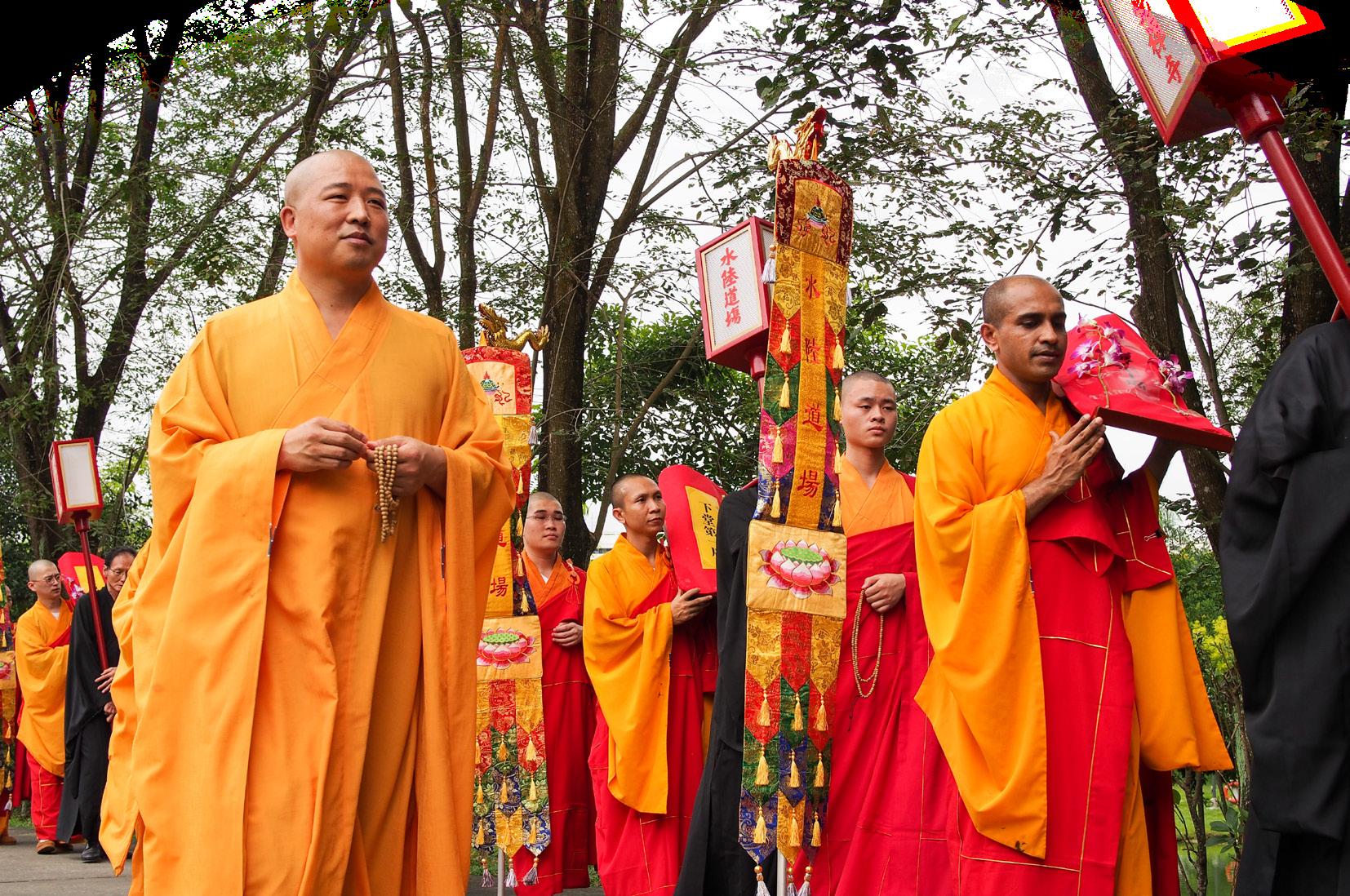


烧圆满香:
此法会即将圆满,普皆回向、发愿以水陆法会一切功德,愿 众生皆得以往生极乐世界。
送判宣疏:
奉请五位判官,将五张判疏送往各界,宣说水陆法会功德圆
满。
圆满送圣:
将所有超荐牌位都收放到西方船上,焚化西方船,象征亡灵 都乘船往生西方极乐世界。为所有参加法会的群灵说法、加
持、供养后,即请圣众归云路,六道众生往生净土。
各坛简介
水陆法会分为内坛及外坛两大部份,其中外坛依道场的场地 大小可分大坛、诸经坛、法华坛、净土坛、楞严坛、华严 坛,每个坛口都是法会不可或缺的部分。
内坛
内坛是整场水陆法会的精神重镇。内坛佛事从法会第三天凌 晨二时起,主要与四圣六凡交流。由于内坛佛事繁重,加上 主法者要承担整个法会的因果,主法者必须专心观想,因此 内坛必需设置结界。为防止外人闯入坛场,故由部份功德主 作为代表参加礼拜佛事。内坛礼拜集十二部大藏经之精华而 成的水陆仪轨,为所有忏悔超度法门之王,大集胜因以济冥 阳两利,解脱功德不可思量。内坛也将举办放生仪式,以此
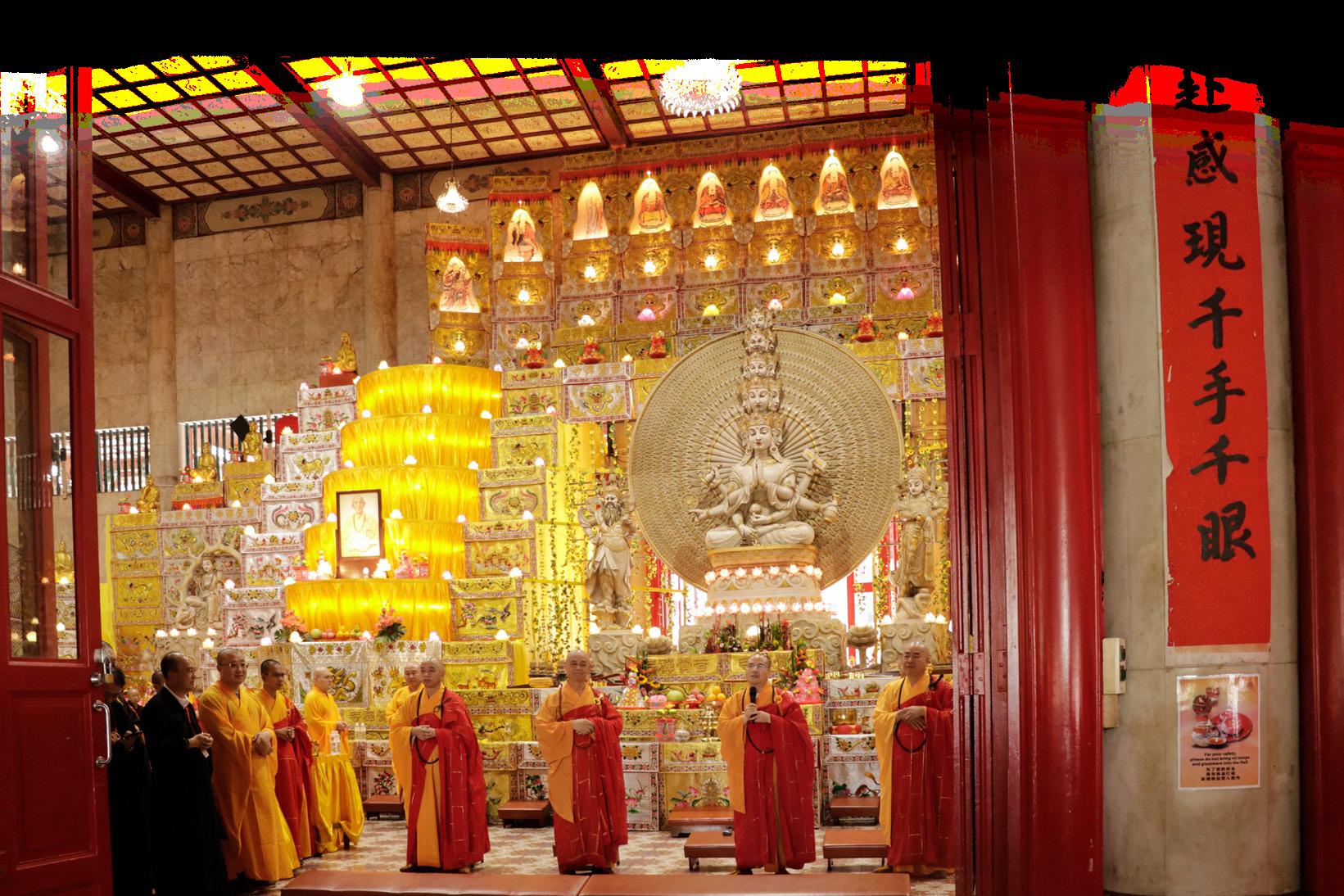


THE GRAND PRAYER THAT BLESSES AND BENEFITS ALL SENTIENT BEINGS 12
外坛 大坛:
礼拜《梁皇宝忏》二十四部连续七日,并谨依仪轨施放瑜伽 焰口、斋天、延生及往生普佛,得以灭罪、消灾和济度亡 灵,功德广大无边。
华严坛:
恭诵《大方广佛华严经》一部,阐扬佛世界的伟大,圆满成 佛因,成就佛果。
楞严坛:
恭诵《大佛顶首楞严经》二十四部,为解脱首楞严三昧法
门,能成就圆满佛道,不遭魔业,成就菩提圣果。
法华坛:
恭诵《大乘妙法莲华经》。此经简称《法华经》,被誉为经 中之王。经中包含了所有佛说的道理二十四部,就像海纳百 川一样,会乘归一乘行大悲愿,得大加持。


诸经坛:
恭诵《金光明经》、《大方广圆觉经》、《佛说无量寿经》、 《观无量寿经》、《金刚般若波罗蜜经》、《药师琉璃光如
来本愿功德经》、《梵网菩萨戒经》等大乘经典各二十四
部,阐述各种解脱法门,消除一切橫逆不順与业障。福慧增 长,并积累善法贤粮。通过至诚回向,使法界六道众生,蒙
佛加持普得利益。
THE
GRAND PRAYER THAT BLESSES AND BENEFITS ALL SENTIENT BEINGS
净土坛:
恭诵《阿弥陀经》 念佛、绕佛、拜佛
等,在世者能增长 福慧,而已故者能
往生净土。清净身 语意三业,念持佛
名号,祈求及发愿 往生西方净土。
巴利坛:
由于善法因缘成就,本寺特设巴利坛,恭诵巴利语《祝福 经》、《三宝经》、《慈爱经》、《大奢利摩难经》、《大
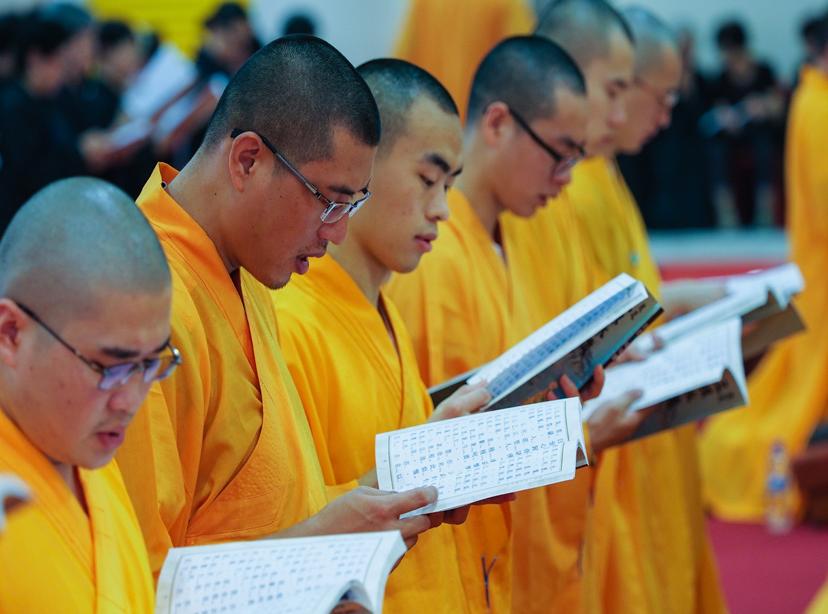



迦叶觉支经》、《大目连觉支经》、《大纯陀觉经》、 《初转法轮经》及《户外经》。祈祷世界和平、人民安乐、 国泰民安、风调雨顺。
水陆法会旨在让十方信众参与胜会,同沾水陆功德利益。水 陆法会虽分不同的坛场,其实是一堂整体的佛事。每个坛场 同等重要,缺其一就不能名之水陆法会。每日总回向宣读文 疏,昭告十方法界,将每日所诵经典功德回向。因此,水陆 法会是不分内外坛的,斋主们随己发心,共成就此一法会, 就是最大功德。诵经功德贵在自己的发心虔诚,发心愈大, 虔诚愈深,则功德广大愈是不可限量。
THE GRAND PRAYER THAT BLESSES AND BENEFITS ALL SENTIENT BEINGS 14
THE GRAND PRAYER THAT BLESSES AND BENEFITS ALL SENTIENT BEINGS
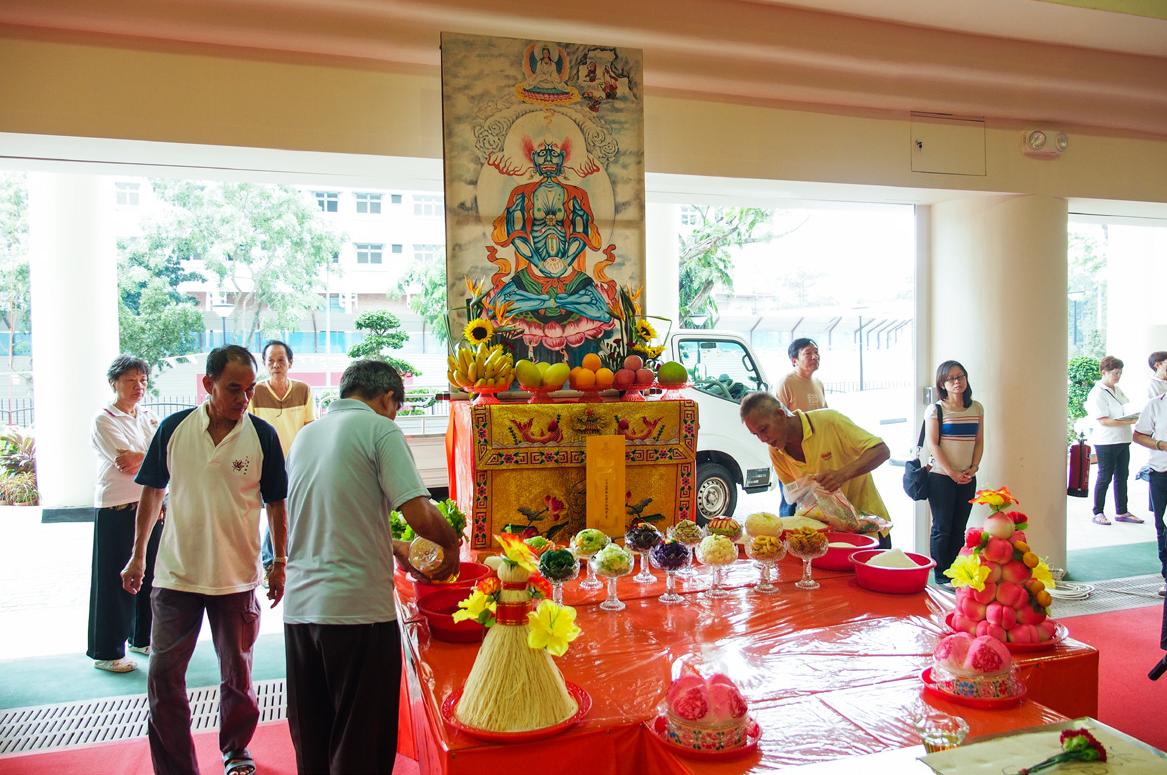



法事简介 梁皇宝忏
《梁皇宝忏》是梁武帝为超度皇后郗氏而由宝志禅师等高僧 撰写的忏悔文。郗氏皇后生前嫉妒六宫,性子惨毒;死后堕
为蟒蛇之身,被小虫唼啮全身,痛苦难堪。她托梦于梁武 帝,祈求拯拔她的痛苦。梁武帝为超度郗氏,请宝志禅师等 高僧撰写《梁皇宝忏》,请僧众施行忏仪以为救度。《梁皇 宝忏》乃佛门中最悠久之忏法之一,被称为佛教中忏悔灭罪 之忏王,亦是经忏中生亡两利之宝典。僧俗四众修此忏法, 得以灭罪、消灾和济度亡灵。
瑜伽焰口
“焰口”是饿鬼的名字,又称“面然”。瑜伽焰口的由来源 自于佛陀时代,佛陀的侍者阿难尊者在森林间禅修习定,夜
见鬼王咽细如针、腹大如山、口吐火焰。面然告诉阿难自己 生前悭吝、贪心,因此死后堕入饿鬼道,常年处在饥饿中受 种种苦,一张口咽喉就会喷火(故名“焰口”),食物未受 到口中就会化成灰烬。鬼王告诉阿难三天后阿难寿命终了也 会堕入饿鬼道。阿难赶紧向佛陀祈请救苦之法。佛陀告诉他 焰口施食的方法,透过诵咒加持让鬼道众生可以享用食物。 瑜伽焰口是根据《救面然饿鬼陀罗尼神咒经》而举行的一种 佛事,其主要内容不仅是通过不同的咒语让召请来的饿鬼得 到一顿安稳的餐食(因此也称作“施食”),更重要的是通
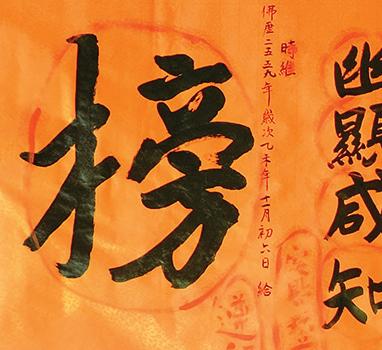


THE GRAND PRAYER THAT BLESSES AND BENEFITS ALL SENTIENT BEINGS 16
THE GRAND PRAYER THAT BLESSES AND BENEFITS ALL SENTIENT BEINGS
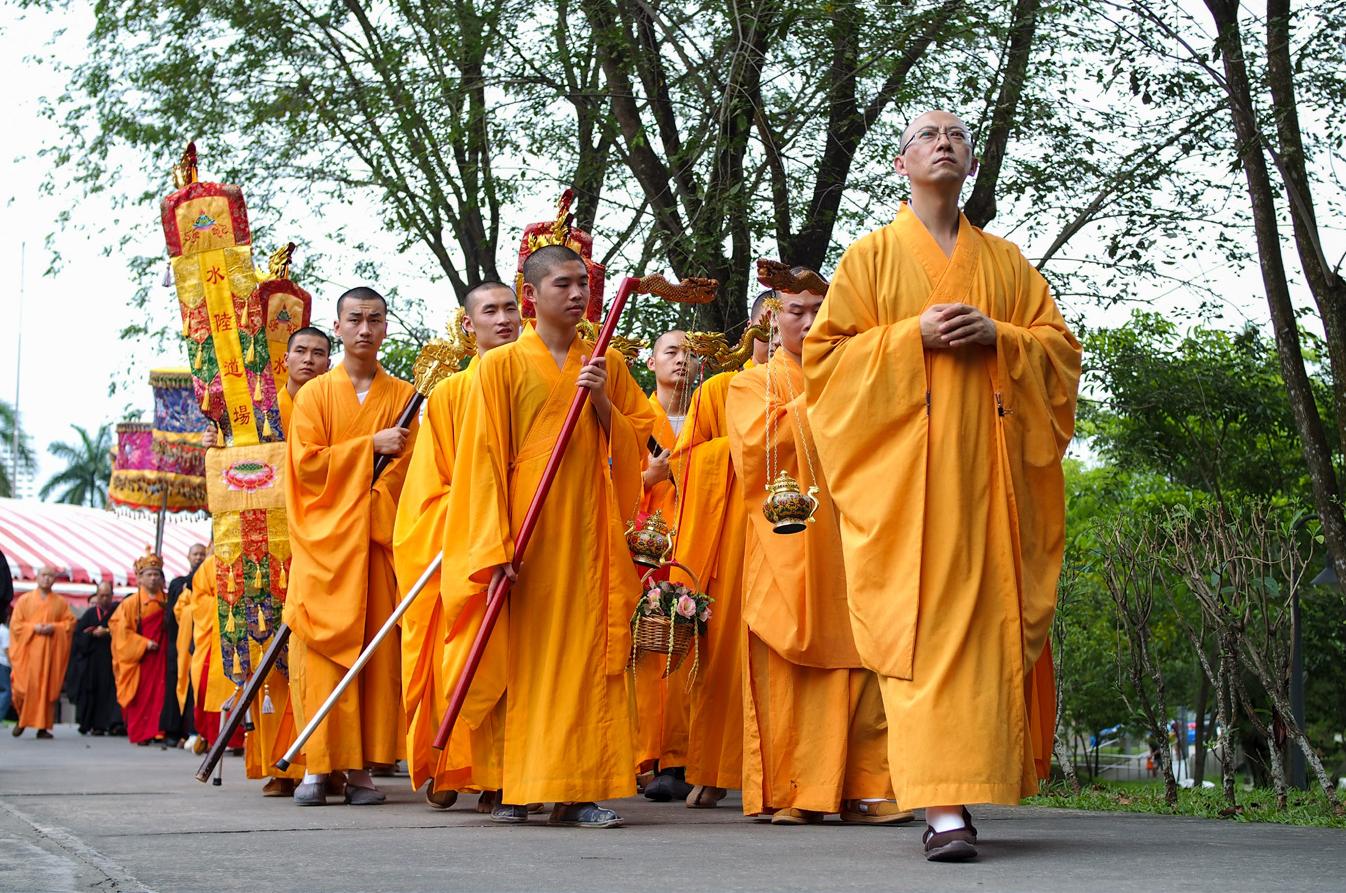


延生及往生普佛
普佛是佛教法事的一种,内容包括香赞、佛号、忏悔文、赞 佛偈、拜愿、三皈依、回向。普佛是一种忏仪,同时也是一 种表达祝愿、荐亡回向的仪轨。普佛可以分为延生普佛和往 生普佛,延生普佛的目的是消灾延生,让生者福寿康宁、离 诸灾厄;往生普佛则侧重往生追荐、让亡者远离恶道、脱离 苦海。
THE GRAND PRAYER
THAT BLESSES AND BENEFITS ALL SENTIENT BEINGS

THE ORIGIN
The Grand Prayer That Blesses and Benefits All Sentient Beings, also known as Water and Land Dharma Puja, is one of the grandest and most meritorious Chinese Buddhist prayers. The Water and Land Puja generates merits through o erings of food and grand prayers of the Dharma to the Four Enlightened Realms of the ten directions (i.e. Buddha, Bodhisattva, Pratyeka-buddha and Sravaka) to liberate sentient beings from su ering in the six Unenlightened Realms (i.e. Gods, Humans, Asuras, Animals, Hungry Ghosts and Hell Beings) and to deliver the beings in the Spirits Realms of the ten directions.
According to the Chronicle of the Buddhas and Patriarchs, Emperor Liang Wudi (464—549) had a dream in which a holy monk advised, “The beings of the four kinds of birth and six paths of existence undergo countless su erings. Why don’t you establish a great vegetarian o ering for sentient beings who live in water and on land to save them?”


Under the encouragement of Venerable Chan Master Baozhi (418—514), Emperor Liang Wudi researched the Buddhist Scriptures and created a text of the Water and Land Puja ritual after three years.
Emperor Liang Wudi held the Text of the ritual at night, long knelt before the Buddha and said: “If this ritual text is not written in a proper style, if it is contrary to the Buddha doctrine, and cannot be widely used to help all
THE GRAND PRAYER THAT BLESSES AND BENEFITS ALL SENTIENT BEINGS
sentient beings, then let the candle be dark as before. If the principles fit and can help all sentient beings, let the candle light up itself.” After bowing to the Buddha, all the lamps and candles were lighted up, and endless flowers fell from the sky, thus showing the a rmative merits of the Water and Land Puja.

The first Water and Land Puja was held in the fourth year of Tianjian era (505), under the reign of the Emperor Liang Wudi at the Golden Mountain Temple in Zhenjiang. The Puja’s sponsor was Emperor Liang Wudi. The chief Puja Master was Venerable Vinaya Master Sengyou (445518). The completion of merits from the Water and Land Puja requires seven days of non-stop Dharma chanting and food o erings. It is di cult for a regular temple to organise such an event as it requires the involvement of a minimum of dozens to a hundred monastics, the deployment of manpower and the utilisation of enormous resources. If a wealthy individual decides to solely undertake the sponsorship of the Puja, it is known as a Single Surname Water and Land Puja; if a group of devotees come together to pool resources and raise funds to sponsor the Puja, it is known as a Water and Land Puja with Multi Surnames,
The full name of The Grand Prayer That Blesses and Benefits All Sentient Beings is “The Supreme Assembly of Great O erings to Enlightened and Ordinary Beings within the Dharma Realm for the Universal Liberation of All Beings of Water-land”.

THE GRAND PRAYER THAT BLESSES AND BENEFITS ALL SENTIENT BEINGS 20
The meaning of each term is as follows:
1. “Dharma Realm” refers to “the oneness and equanimity of everything in the entire universe”.

2. “Enlightened and Ordinary Beings” refers to “the ten Dharma Realms of which there are Four Enlightened Realms, (i.e. the realms of the Buddhas, Bodhisattvas, Solitary Buddhas and Arhats); and the Six Unenlightened Realms, (i.e. the realms of Celestial beings, Humans, Asuras, Hell Beings, Hungry Ghosts and Animals)”.

3. “Water-land” refers to “the places where sentient beings live, which includes land, water, and the sky”.
4. “Universally Liberate” refers to “treating all sentient beings equally, making universal o erings to every single being and enabling them to be liberated from samsara (i.e. the cycle of birth and death and attained nirvana) which is the goal of the Buddha-dharma”.
5. “Supreme Assembly” refers to “the assembly to share the Dharma”. Besides o ering food and water to sentient beings, the sharing of the Dharma is also performed through reciting sutras and mantras, enabling sentient beings to receive the nourishment of the Dharma, freeing them of their mental su ering and allowing them to achieve happiness. “Assembly” also holds the meaning of a gathering. This is a place where sentient beings with the same faith and belief gathered to make o erings
THE GRAND PRAYER THAT BLESSES AND BENEFITS ALL SENTIENT BEINGS
to the Triple Gem. Lay devotees are also invited to join monastics in the recitation of sutras and mantras for the sake of benefitting all sentient beings.
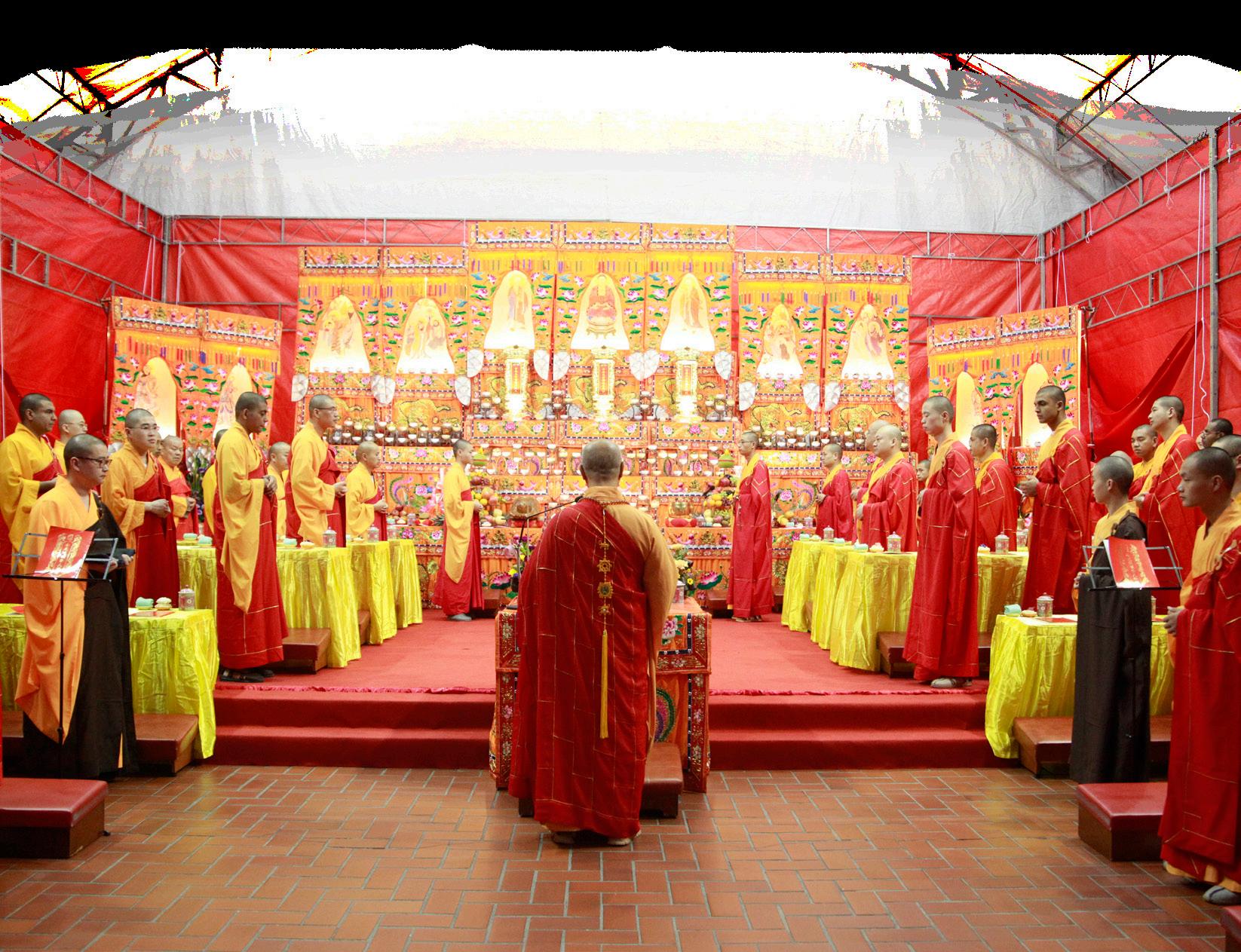

Besides the given name, the Water and Land Puja is also known as: The Water and Land Assembly; The Water and Land Way-place; The Festival of Compassionate Benefit; The Great Festival of Unlimited O erings to Beings of Water and Land; The Great Festival to Benefit both the Living and Departed in Heaven and Earth, Water and Land.

THE GRAND PRAYER THAT BLESSES AND BENEFITS ALL SENTIENT BEINGS 22
THE BENEFITS OF PARTICIPATING IN THE WATER AND LAND PUJA
The Water and Land Puja is a great Dharma function to save all sentient beings, so that they can get rid of unwholesome realms, be happy and free from su ering. For the beings who join the Water and Land Puja, they and their families can eliminate disaster, prolong life, and increase blessings and literacy.
1. Benefits for the living:

Venerable Songze had stated in Shui Lu Yuan Qi, “Those who make o erings even to only one Buddha, to only one monk, to only one poor people or to advise people doing one good deed would accumulate an infinite amount of merit. In this case, one is making o erings to the Triple Gem of the ten directions and the tens of thousands of sentient beings within the Six Realms. The merit arising from this is definitely going to benefit not only oneself but also one’s immediate and extended family”. The Sutra on O ering Food also says: “For one who makes a delicate o ering to the Triple Gem, one shall be blessed with a long life; a strong, healthy and good-looking body; wealth and reputation; and be able to make skilful defence of the Buddha-dharma”.

THE GRAND PRAYER THAT BLESSES AND BENEFITS ALL SENTIENT BEINGS
2. Benefits for the departed
The deceased who read, listen and practise the Buddhadharma, take refuge in the Triple Gem, and honour the precepts will be able to possess a compassionate heart, increase good virtue, and be liberated from the three evil realms, thus releasing them from su ering and gaining happiness. Besides that, for those who have not acquired Bodhicitta (the altruistic intention to achieve Buddhahood to benefit sentient beings), strong Bodhicitta shall arise due to this supreme Water and Land Puja. For those who are not liberated from the su ering wheel of Samsara, they shall attain the state of non-regression. For those who have not attained Buddhahood, they shall achieve perfect Buddhahood because of this supreme event.



THE GRAND PRAYER THAT BLESSES AND BENEFITS ALL SENTIENT BEINGS 24
THE RITUAL OF WATER AND LAND PUJA
The three main processes of the Water and Land Puja (i.e. invitation, o erings and deliverables) can be further classified into the following:

Purifying The Grounds and Setting Boundaries: At the beginning of the Puja, and before the arrival of the Triple Gem (Buddha, Dharma and Sangha), the Heavenly Dharma protectors will be the first to be invited to the Upper Hall to protect and purify the boundaries within the Hall. This is done through the recitation of the Dharma and the sprinkling of blessed water above, below and across the boundaries in four directions to purify the body and mind of the guests (including monastics, laity, etc.) when they enter the premises.
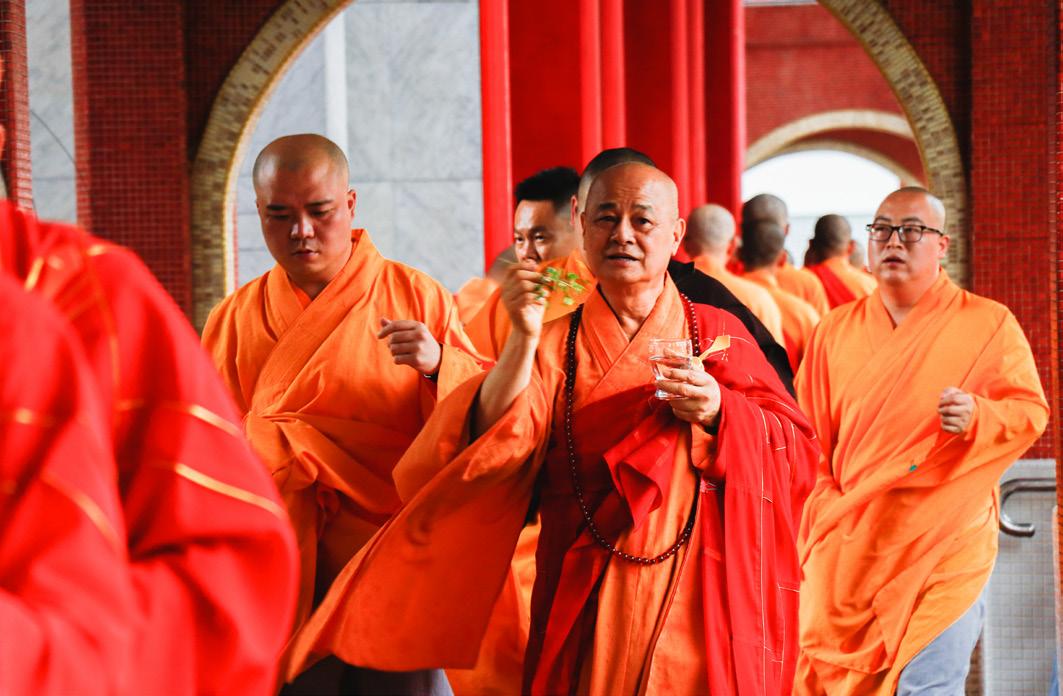

THE GRAND PRAYER THAT BLESSES AND BENEFITS ALL SENTIENT BEINGS
Issuing the Divine Runes and Raising the Banner: Issuing the Divine Runes is like issuing invitation letters to the celestial court in heaven so that Celestial beings, Buddhas, Bodhisattvas, and sentient beings of the six realms are all invited to the Dharma event. The guests are classified under di erent names and groups. Invitation cards are then sent to these guests of the Upper Hall and Lower Hall in ten and fourteen banquet tables respectively with the seats of the holy and ordinary beings arranged according to rank. A banner bearing the words “Assembly of Ten Directions Dharma Realms Water and Land Puja for Liberation of Beings Through Great O ering of Vegetarian Food”, is put up on a pole to the left at the front of the Hall of Great Compassion, or at a higher place, making it visible from afar. At night, lanterns are put up so that wandering spirits can come to attend the Puja and receive the Dharma’s blessings.
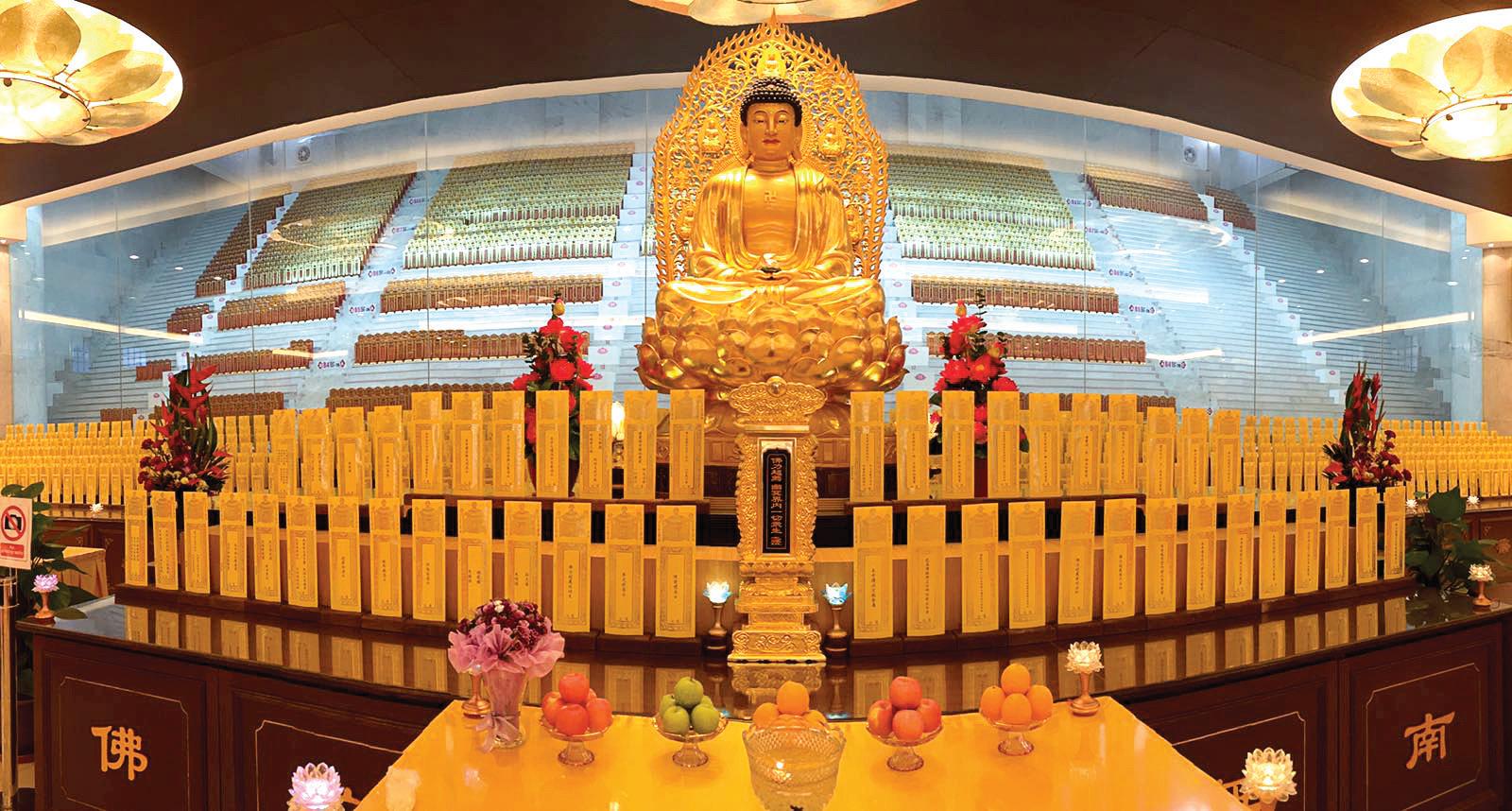


THE GRAND PRAYER THAT BLESSES AND BENEFITS ALL SENTIENT BEINGS 26
Inviting the Upper Hall: Respectfully invite the Buddhas, Bodhisattvas and Sages to come to the Puja, and to request them to teach the Dharma for the benefit of sentient beings. Ten guests are invited from the higher realms, which include the following:
1. Buddha: The Buddhas abiding in the ten directions and their entourage.
2. Dharma: The Sublime Dharmas abiding in the ten directions and their entourage.
3. Bodhisattva: The Bodhisattva Sangha abiding in the ten directions and their entourage.
4. Solitary Realiser: The Solitary Realiser Sangha abiding in the ten directions and their entourage.


5. Hearer: The Hearer Sangha abiding in the ten directions and their entourage.
6. Lineage Masters: The lineage masters of the various Dharma lineages, such as the Zen and Vinaya traditions, and their entourage.
7. Heavenly Beings: The heavenly beings possessing the five miraculous powers who assist in proclaiming the Buddha-dharma and in creating scriptural commentaries, and their entourage.
THE GRAND PRAYER THAT BLESSES AND BENEFITS ALL SENTIENT BEINGS
8. Divine Dharma Protectors: The Divine Dharma Protectors abiding in the ten directions, including the ten Wisdom Kings, Vajra Krodha, the various Heavenly Kings and their entourage.
9. Godly Dharma Protectors: The godly Dharma Protectors, abiding in the ten directions, who protect stupas and shrines housing Buddha relics, watch over monastic communities, and protect households and countries, and their entourage.


10. Great Sages: The ten great sages who established and propagated the Water and Land Puja, and their entourage.
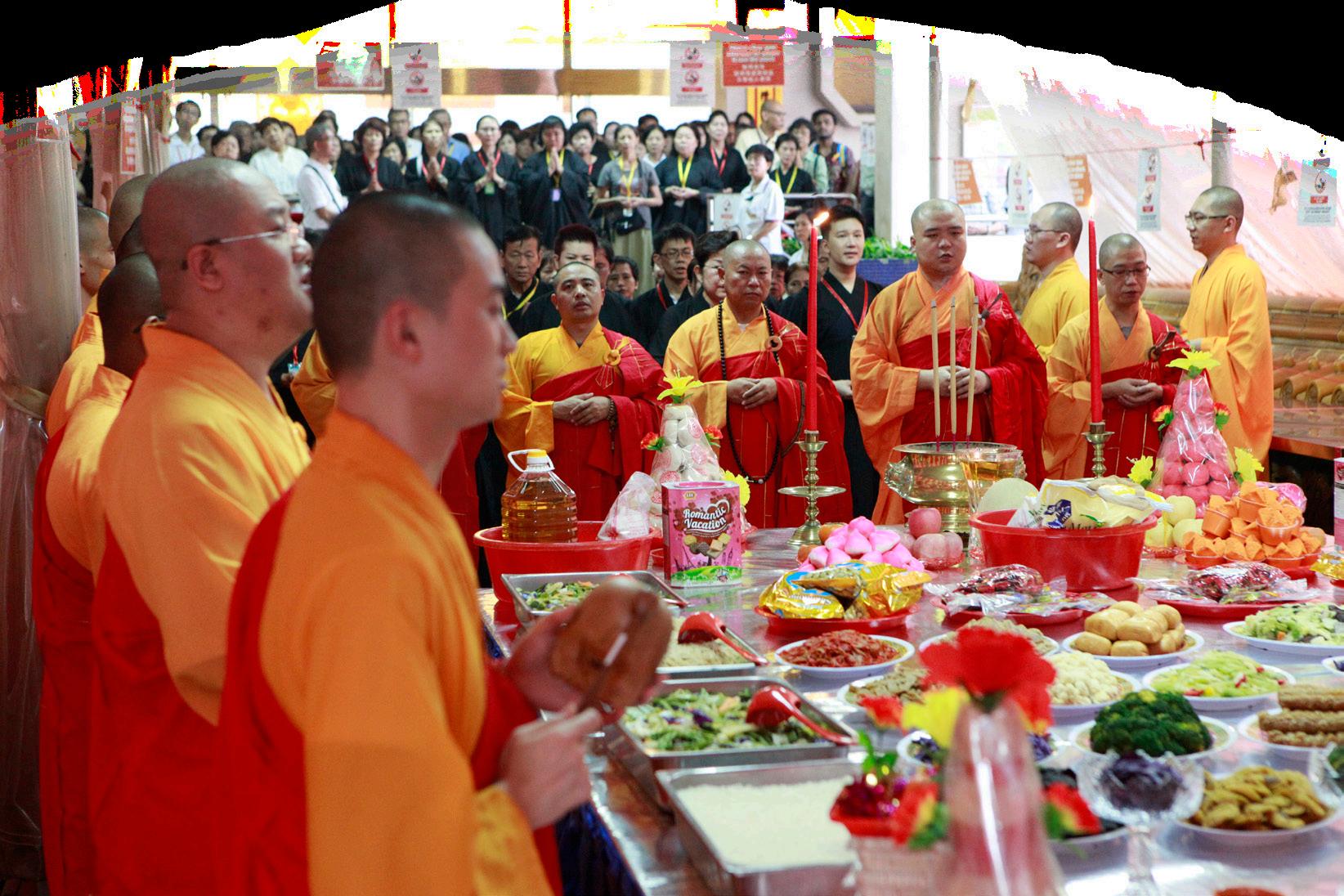
THE GRAND PRAYER THAT BLESSES AND BENEFITS ALL SENTIENT BEINGS 28
Making O erings to the Upper Hall: O erings are made to the Buddhas, Bodhisattvas and Sages who have been invited to be seated at the ten banquet tables inside the Inner Shrine. The o erings comprising the following elements that please the six senses: incense, flower, lamp, food, treasure and the Dharma are made by the Puja sponsors to express their devotion and respect to the holy beings.
Notice of Amnesty: Before inviting the beings of the Lower Hall, Notice of Amnesty is to be obtained. Two divinities are invited as envoys to deliver a “Letter of Request” and an “Amnesty Document” to the Heavenly Gods governing the six realms; seeking their permission to allow the miserable beings in the lower realms such as Hungry Ghosts and Hell beings to obtain amnesty, allowing them to attend the Water and Land Puja, receive the o erings and listen to the Dharma.
Inviting the Lower Hall: Inviting the beings of the Lower Hall to attend the assembly. There are fourteen banquet tables in the Lower Hall:


THE GRAND PRAYER THAT BLESSES AND BENEFITS ALL SENTIENT BEINGS
What is the significance of the Puja to Purify The Grounds?


1. Three Realms of Heaven: The Heavenly beings and their entourage abiding in the ten directions in the Form, Formless and Desire realms, including the sun, moon and stars.
2. Temple Gods: Worldly gods and their entourage abiding in the ten directions in the air and temples.
3. Sages: Kings, queens and concubines; military and court o cials; Confucian sages and Taoist hermits abiding in the ten directions, and their entourage.
4. Earthly beings: The ten types of people of various social status abiding in the ten directions, including farmers, workers, businessmen, physicians, fortune tellers, and their entourage.
5. Asura: The beings of the four types of birth and five realms of existence residing within the ten directions, those who live in the mountains and beneath the seas, the asuras, and their entourage.
6. Hungry Ghosts: The Flaming-Mouthed King of Ghosts and the various ghostly beings of the three classes and nine categories abiding in the ten directions, including Hungry Ghosts, victims of untimely death, wandering spirits, and their entourage.
7. Hell Kings and Related: The Yama Kings, their sisters, the 18 lesser kings of hell, the various hell o cials abiding in the ten directions, and their entourage.
THE GRAND PRAYER THAT BLESSES AND BENEFITS ALL SENTIENT BEINGS 30
8. Hell beings: All su ering beings abiding in the ten directions who are bound to the eight hot and cold hells, and their entourage.
9. Animals: The ten categories of beings in the animal realm abiding in the ten directions, including those with scales or feathers, and their entourage.


10. Spiritual Beings Yet to be Born: Beings from the various realms of existence abiding in the ten directions who are currently in the intermediate state and taking rebirth once every seven days for 49 days, and their entourage.
11. Town Deity: The deity/deities responsible for the town in which the monastery resides, all departed ancestors, royalty, and their entourage.
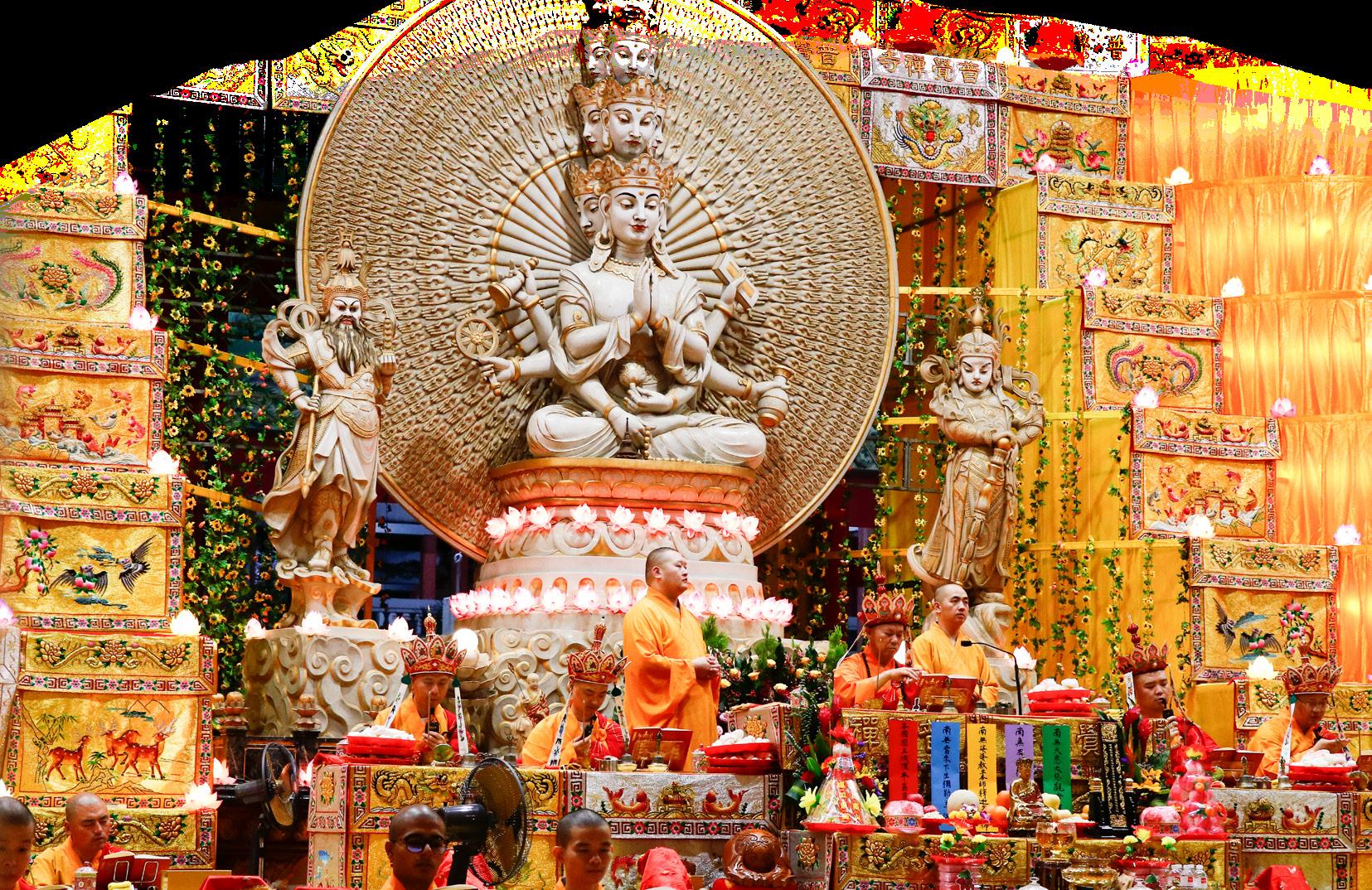
THE GRAND PRAYER THAT BLESSES AND BENEFITS ALL SENTIENT BEINGS
12. Land Deity: The six resident deities of the monastery, the other deities and their entourage.
13. Ancestors: The participant’s departed ancestors, teachers, friends, immediate family members and relatives.
14. Masters: Departed ancestors, teachers, friends, immediate family members and relatives.


Making O erings to the Lower Hall: The o erings that are pleasing to the six senses (incense, flower, lamp, food, treasures and the Dharma), help humans discover the truth and return to a life of purity, asuras to overcome their anger, hungry ghosts to become satiated, animals to acquire wisdom, and hell-beings to gain freedom from their painful existence.
Bestowing Precepts to the Deceased: The ten Bodhisattva precepts are given to the departed so that they may observe the precepts and avoid all negativities of the Body, Speech and Mind. The precepts also help purify their mind and increase their virtue and wholesomeness.
Completion O erings: The granting of precepts to the departed brings joy to everyone, including humans and gods. The Completion O erings are then o ered to all guests seated at the twenty-four banquet tables. This o ering of vegetarian feast, before seeing o all the beings in the Higher and Lower Halls, not only represents
THE GRAND PRAYER THAT BLESSES AND BENEFITS ALL SENTIENT BEINGS 32
the grand closure of the Puja but also the devotees’ unending commitment, which continues right into their afterlife, to upholding the precepts and practices.
Completion Incense: Once the Water and Land Puja comes to a fruitful ending, the dedication of merits is extended to all sentient beings and accompanied by strong prayers for them to be reborn in the Pure Land of Ultimate Bliss.

Reading of the Five Judgment Proclamations:
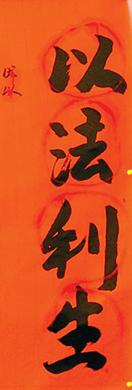

Puja invokes the five Judges, requesting them to send the five Judgment Proclamations to the various realms to proclaim the successful completion of the Water and Land Puja.

THE GRAND PRAYER THAT BLESSES AND BENEFITS ALL SENTIENT BEINGS
Seeing O Enlightened Beings: All prayer tablets are collected and put on the ship destined for the Western Pure Land. The ship will then be burnt as an o ering, signifying the successful ferrying of the departed beings to the Pure Land.
After the Dharma speech, the enlightened and holy beings are requested to return to their places of origin while the sentient beings of six realms take rebirth in the Buddha Pure Land.
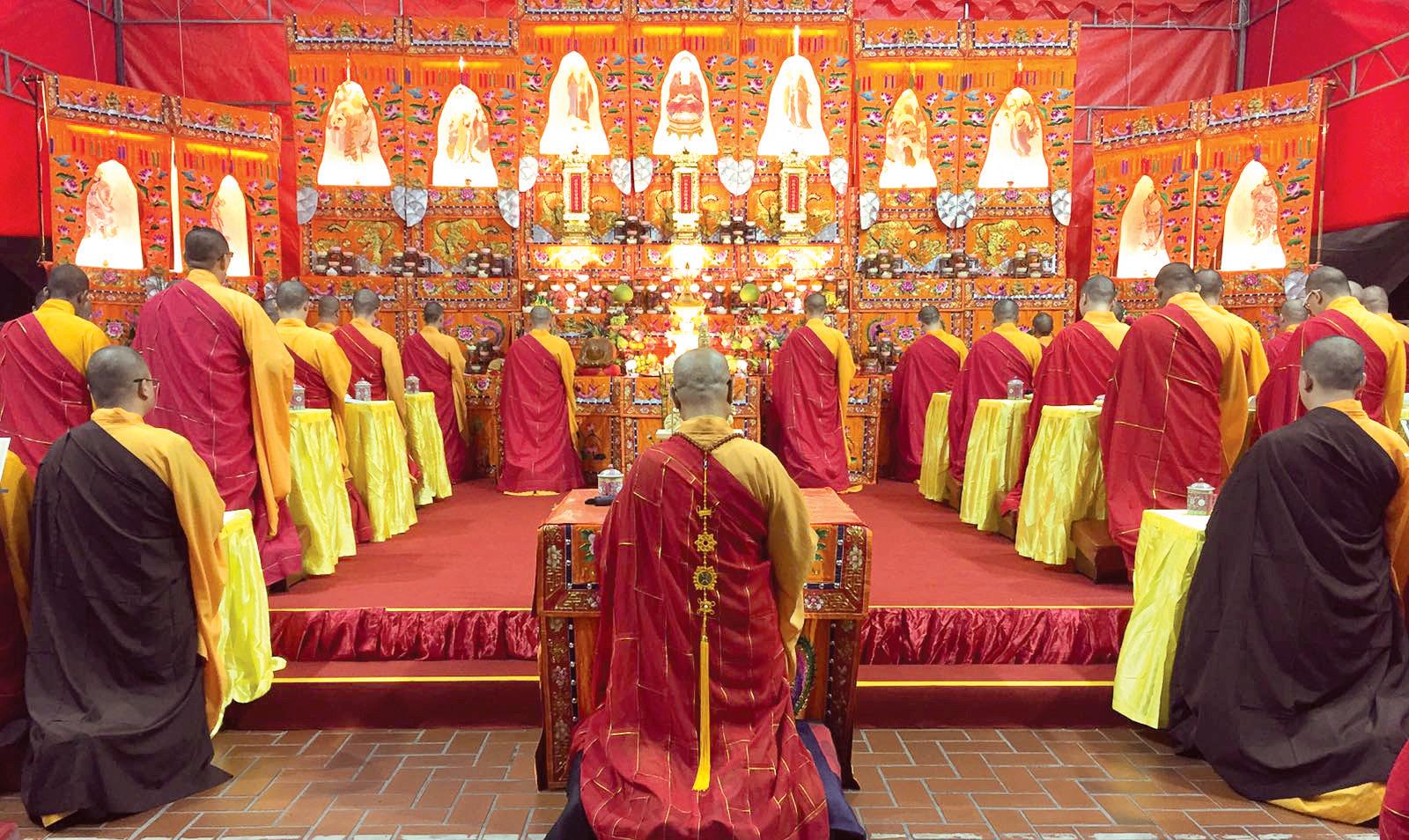


THE GRAND PRAYER THAT BLESSES AND BENEFITS ALL SENTIENT BEINGS 34
INTRODUCTION OF SHRINES


The ritual venue consists of two main sections, the Inner Shrine and the Outer Shrine. The Outer Shrine can be further classified into the Grand Shrine, Shrine of the Various Sutras, Lotus Shrine, Pure Land Shrine, Surangama Shrine, and Flower Adornment Shrine. Every Shrine forms an essential part of the Water and Land Puja.
Inner Shrine
The Inner Shrine is the heart of the Water and Land Puja, with its chanting process commencing at 2am on the third day. The chant serves as the centre of communication with the Four Enlightened Realms and the Six Ordinary Realms.
Due to the complex nature of the Inner Shrine Pujas and the heavy karmic responsibility placed on the Master
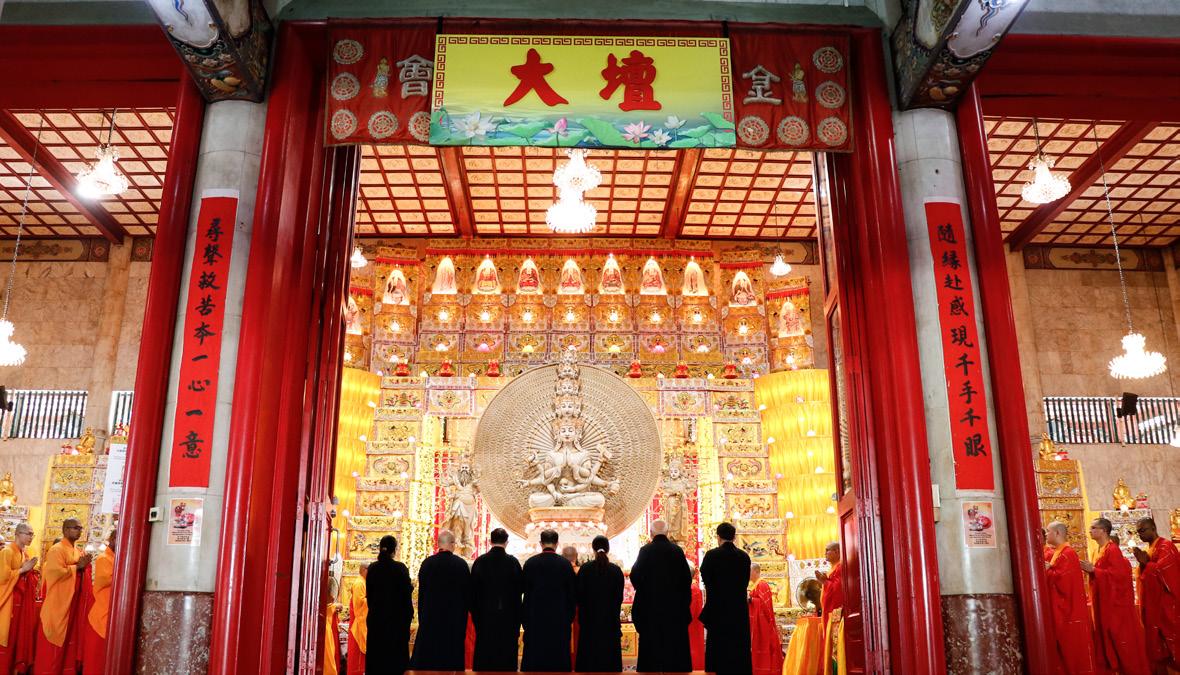
THE GRAND PRAYER THAT BLESSES AND BENEFITS ALL SENTIENT BEINGS
conducting the ceremony, it is vital for the Master to maintain unwavering focus. Boundaries must be set, to prevent any unwanted intruders.
Only selected sponsors are allowed into the shrine to represent all the sponsors participating in the Pujas. Recitations and prostrations are then made to the Water and Land Puja Text, which contains the essence of the Buddhist Canon, making it the most powerful of all purification and deliverance ceremonies. This ceremony benefits both the living and those in the spirit realms, creating a tremendous amount of merit towards liberation. Animal liberation is also conducted to create an abundance of extensive merit to help liberate beings bound to the spirit realms.
Outer Shrines


Grand Shrine:
Perform twenty-four sets of the Liang Huang Jewelled Repentance liturgy consecutively over seven days. Additionally perform the rite of releasing Flaming Mouth for the deliverance of Hungry Ghosts, Vegetarian Food O erings to the Celestial Beings and Grand O erings to the Buddhas, all aimed to eradicate bad karma and disasters, liberating the deceased from su ering, and attaining unlimited merits.
THE GRAND PRAYER THAT BLESSES AND BENEFITS ALL SENTIENT BEINGS 36
Flower Adornment Shrine:
Recite one set of the Avataṃsaka Sutra, which explains the greatness of the Buddha World and the ways and means to achieve perfect Buddhahood.
Surangama Shrine:
Recite twenty-four sets of the Surangama Sutra, which explains the method to accomplish the Surangama Samadhi, the foremost method to attaining liberation and achieving perfect Buddhahood as well as to protect one from unwholesome energies and entities.
Lotus Shrine:
Recite twenty-four sets of the Lotus Sutra, which is regarded as the highest level of Buddha teaching. It explains the great compassionate activities of the Buddhas, invoking its powerful blessing.


Shrine of the Various Sutras:
Recite twenty-four sets each of the Sutra of Golden Light, Sutra of Perfect Enlightenment, Sutra of Contemplating the Amitabha Buddha of Infinite Life, Sutra of Infinite Life, Diamond Sutra, Medicine Buddha Sutra, and Brahma
Net Bodhisattva Vows. These sutras describe the various methods to attain liberation and to purify one of all karmic obstacles and negativities such as untimely deaths and problems. The chants bring wisdom and accumulate good deeds and virtue for the individual. Merits will also be transferred through the chants, benefiting sentient beings in the six realms.
THE GRAND PRAYER THAT BLESSES AND BENEFITS ALL SENTIENT BEINGS
Pure Land Shrine:
Recite the Amitabha Sutra through chanting, circumambulating and praying to the Buddha. Strong aspirations are made for oneself and loved ones to be reborn in Amitabha Buddha’s Pure Land of Ultimate Bliss at the time of death and for those who have passed away to be reborn in Amitabha Buddha’s Pure Land. Through purifying the karmas of body, mouth, and mind and reciting the name of Amitabha Buddha, one can pray and make vows to be reborn there.
Pali Shrine (set-up only in KMSPKS): Recite the Mangala Sutra which blesses all beings. The Ratana Sutra o ers protection from unseen spirits, divine and spiritual beings. The Karaniyametta Sutra explains the spreading of universal loving-kindness to all beings.
Recitations of Mahagirimanda Sutra, Mahakassapathera Bhojjhanga Sutra, Mahamogallanathera Bhojjhanga Sutra, and Mahacundathera Bhjjhanga Sutra are intended to bring good health to all devotees and beings. Additionally, the Dhammacakkappavattana Sutra, the first teaching by the Buddha, illuminates the true path to enlightenment. Finally, the Tirokuddha Sutra talks about the transference of merits to both living and departed loved ones.

The purpose of the Water and Land Puja is to allow Buddhist followers from the ten directions to participate in the chanting process, allowing them to gain and

THE GRAND PRAYER THAT BLESSES AND BENEFITS ALL SENTIENT BEINGS
38
increase their merits. Although the Water and Land Puja is subdivided into di erent shrines, the chanting of each shrine takes place simultaneously. Every shrine’s chanting is equally important, and the exclusion of any shrine will result in an incomplete Water and Land Puja.
Daily total transference of merits will be read, recorded and announced to the Dharma Realms of the ten directions, including the accumulation of merits arising from the recitation of sutras and mantras. The Water and Land Puja does not distinguish between the Inner and Outer Shrines. Sponsors who sincerely make o erings to all shrines will receive tremendous merits. The merits accumulated from the chanting of sutras and mantras depend on the sincerity of the devotee chanting it. The greater the sincerity, and faithfulness, the more merits the devotee accumulates.
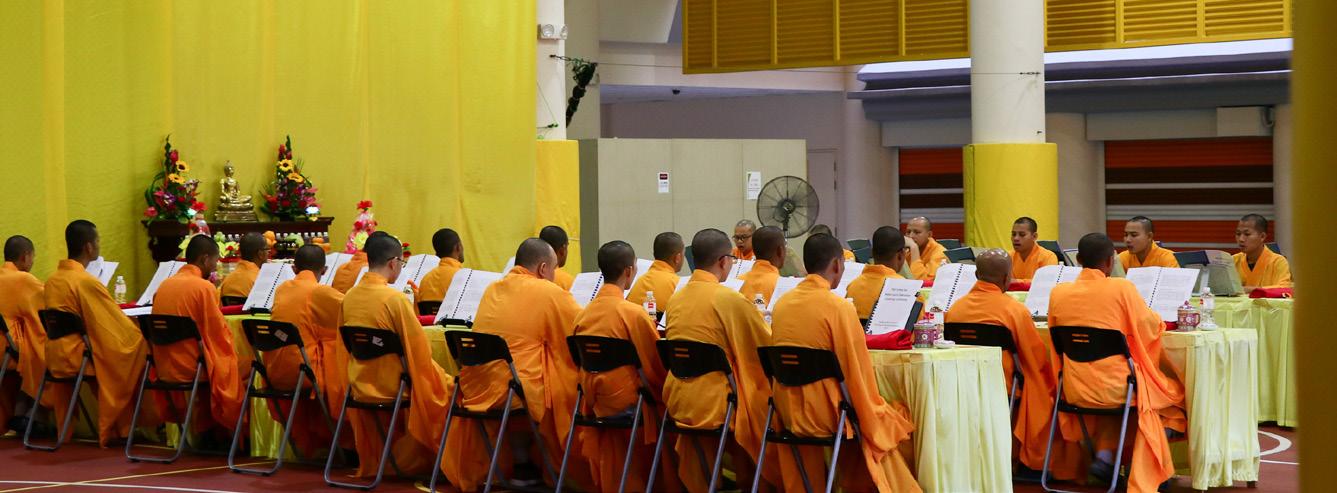


THE GRAND PRAYER THAT BLESSES AND BENEFITS ALL SENTIENT BEINGS
INTRODUCTION OF PUJA


Emperor Liang Jewelled Repentance
The Emperor Liang Jewelled Repentance is a Buddhist text written by Chan Master Baozhi at the request of Emperor Liang Wudi, who wanted the ritual to be performed for his departed wife Empress Chi to deliver her from su ering.
Empress Chi, who had a jealous streak, was displeased that the Emperor believed in Buddhism and hence, she committed many wrongdoings towards the Triple Gem. She died prematurely and was reborn in the miserable realm as a python with her whole body infested with worms, causing her excruciating pain.
The Empress then appeared in Emperor Liang Wudi’s dream, requesting him to pray and save her from her su ering in the lower realm.
Wishing to liberate his Queen, Emperor Liang Wudi invited Master Baozhi and Zen monks to write the “Emperor Liang Jewelled Repentance”. He also invited monastics to perform the repentance ritual to save his Queen from su ering.
“Emperor Liang Jewelled Repentance”, one of the oldest repentance rituals in Buddhism, is also known as the King
THE GRAND PRAYER THAT BLESSES AND BENEFITS ALL SENTIENT BEINGS 40
of repentance rituals. Monastics and laity who practise this will be able to eliminate a iction, bad karma, avoid disaster, and help those in the lower realms.
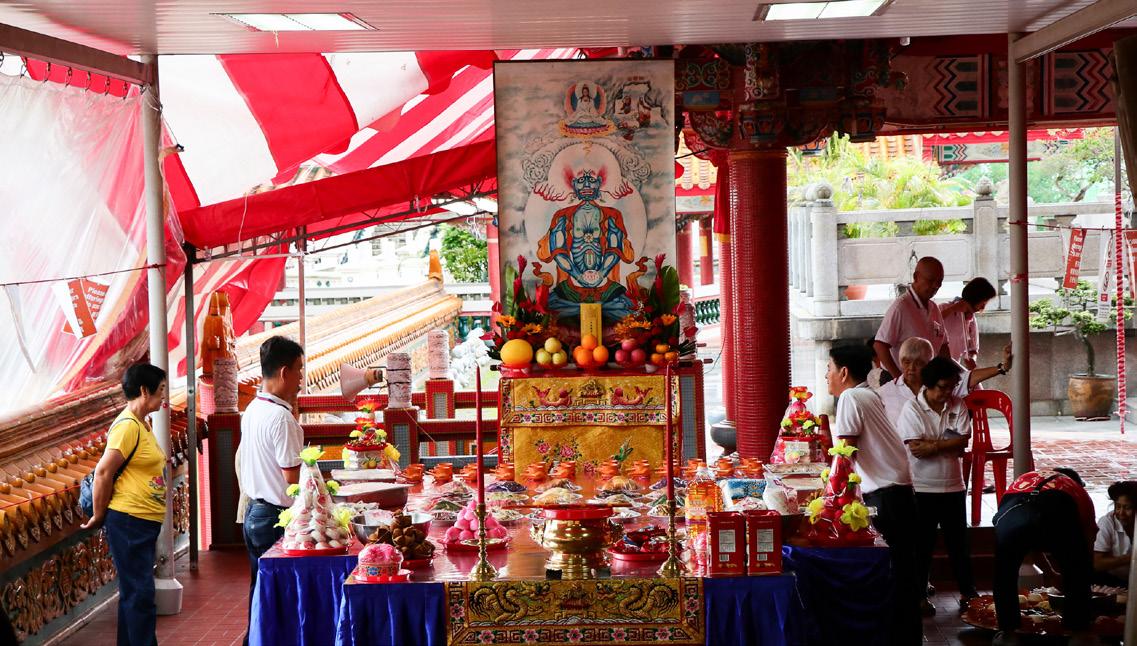


Releasing Flaming Mouth Ritual
“Flaming Mouth” is another name for Hungry Ghosts, with its origin dating back to the Buddha’s era. Venerable Ananda, while meditating in the forest, saw the King of Hungry Ghosts who was emaciated in appearance with hideous features. Its throat was so thin no food could pass through; its stomach jutted out like a mountain, and flame spurted out of its throat. The King told Ananda that he was greedy and miserly while he was alive; hence upon his death, he descended into the realm of hungry ghosts and transformed into that semblance. He had to further endure all kinds of su ering and starvation. Moreover, he foretold Ananda’s own demise in three days, and that he would su er the same destiny. Venerable
Ananda
THE GRAND PRAYER THAT BLESSES AND BENEFITS ALL SENTIENT BEINGS
hurriedly went to the Buddha for advice. The Buddha then taught him “The Discourse on the Feeding of Hungry Spirits” — a way of chanting the spell to provide blessings for the ghosts and spirits to enjoy the food bestowed to them.
The Yogacara Ullambana Dharma Service or “Releasing the Flaming Mouths Ritual” is held in accordance with the Ullambana Sutra. As the ritual is performed to eradicate the hollow hunger of the ghosts by bestowing food and drink to them, it is also known as “Feeding”. More importantly, the ritual seeks to liberate these beings from all su erings through the teachings of Lord Buddha. Generally, the Releasing Flaming Mouth Ritual starts at 2 o’clock based on the Chinese calendar (which is between 7pm to 11pm).
The number of monastics performing the “Releasing Flaming Mouth Ritual” can be either three or five. If the Ritual is performed by three monastics, it will be named as “Releasing Flaming Mouth Ritual Performed by Three Monastics”. If the Ritual is performed by Five monastics, it will be named as “Releasing Flaming Mouth Ritual Performed by Five Monastics”.
O ering to Celestial Beings

O ering to Celestial Beings refers to the o ering of vegetarian food to the Celestial Beings. Folklore usually called it “worship the Lord of Heaven”. As Buddhists take refuge in the Triple Gem, they neither take refuge nor

THE GRAND PRAYER THAT BLESSES AND BENEFITS ALL SENTIENT BEINGS 42
do they make an o ering to Celestial Beings. But based on the scriptures, such as the Sutra of Golden Light, the Celestial Beings consistently perform the ten good deeds, protect and uphold the Dharma, and do not possess evil karma. Therefore, to show gratitude to the Celestial Beings Dharma, a festive event is organised to facilitate the o ering of vegetarian foods to the Celestial Beings.
At first, Master Zhizhe (538 597) of the Sui Dynasty, taking mainly the Sutra of Golden Light as the scripture base, formulated the “Golden Light Repentance”. Eventually, it developed into a ceremony that has tablets placed for Celestial Beings


During the Song Dynasty, food o erings to the Celestial Beings of Heaven had been initiated for the heavens. Later in the Yuan Dynasty, passages related to Heavenly Beings were extracted from the “Golden Light Repentance” to form a single text for praying in the temple on an annual basis. Since then, the O ering to Buddha and the Celestial Beings has been widely celebrated.
Grand O erings to the Buddhas
In Buddhism, Grand O erings to the Buddha is known to be a form of Dharma practice. It consists of various practices such as Buddha name recitation, repentance text, praising of the Buddha, praying, wishing, and seeking
THE GRAND PRAYER THAT BLESSES AND BENEFITS ALL SENTIENT BEINGS
44


refuge in the Triple Gem, etc. The Grand O erings to Buddhas can be considered as a form of wish-making for the living and the deceased. For the living, it is a wish to be healthy and well. For the deceased, it is a wish that they will stay away from evil paths and be released from su ering and misery.
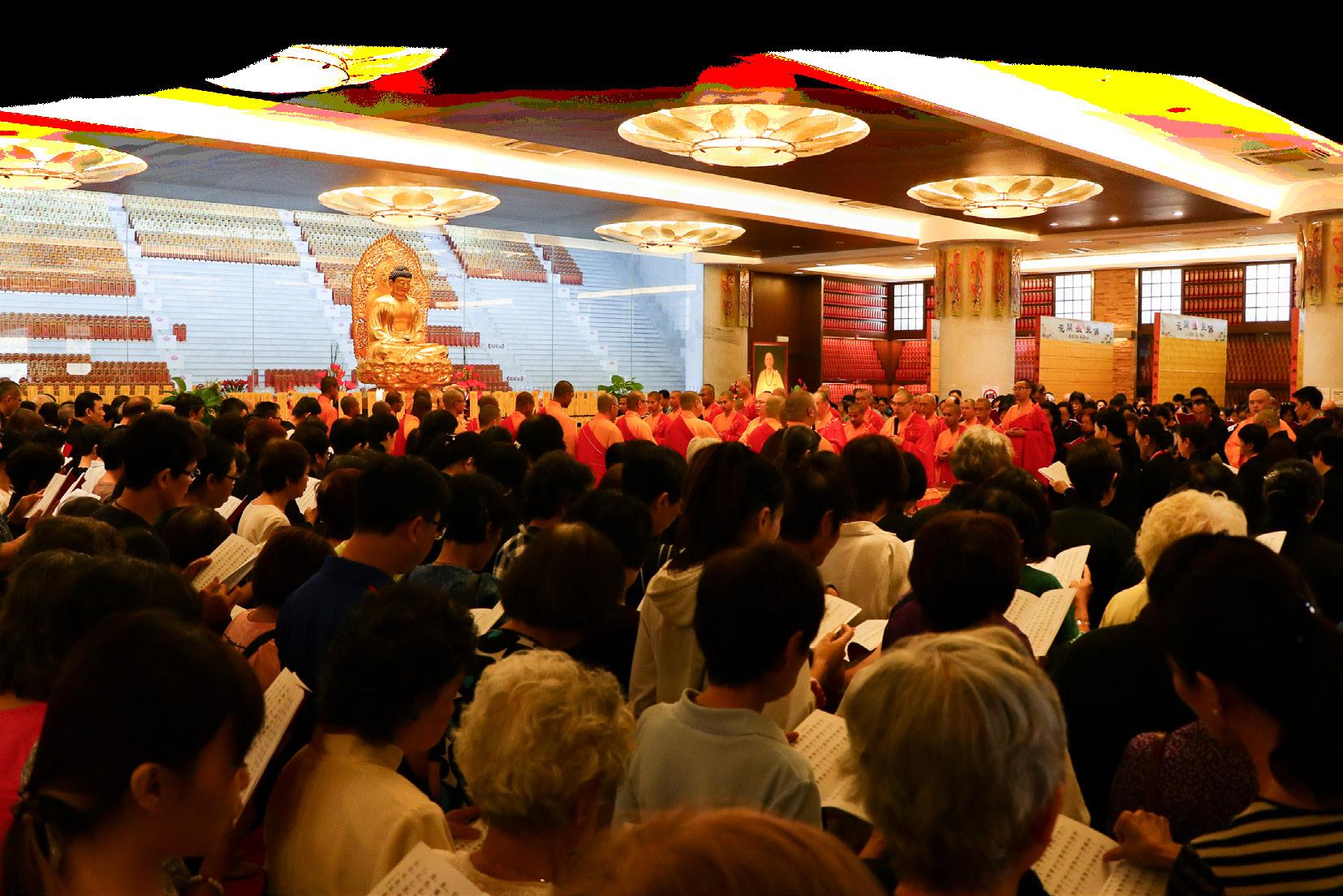
THE GRAND PRAYER THAT BLESSES AND BENEFITS ALL SENTIENT BEINGS



 THE GRAND PRAYER THAT BLESSES AND BENEFITS ALL SENTIENT BEINGS
THE GRAND PRAYER THAT BLESSES AND BENEFITS ALL SENTIENT BEINGS
































